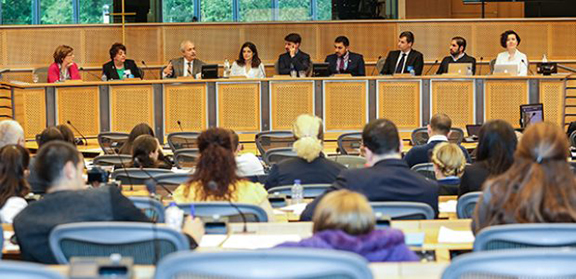Avrupa’da diaspora olmak


Brüksel - Geçtiğimiz hafta Avrupa Parlamentosu, Ermeni, Yahudi, Roman , Süryani organizasyonları ve STK temsilcilerinin katıldığı “A Europe of Diasporas” (Avrupa’nın Diasporaları) adlı kapalı bir konferansa ev sahipliği yaptı. Siyasetçiler, öğretim görevlileri, analistler ve sanatçıların katıldığı toplantı Diaspora ve Avrupa’daki Diasporalar ile ilgili bir çok soruya cevap vermeye çalıştı.
Toplantıda “Avrupalılık” söylemi dahilinde Avrupa’da yaşayan Diasporaların halihazırdaki “yenilenme sürecine” ortak olmaları, Avrupa’yı kendi kültürleri ile zenginleştirmelerinin yanısıra bir Diaspora grubu ağı kurulmasını fikri etrafında da görüşmelerde bulunuldu.
Avrupa’da 90’dan fazla Diaspora topluluğu olduğu belirtilirken, oluşturulacak ağın belki de yeni gelen göçmenler için de yardımcı nitelik taşıyacağı, bu sayede fikir alışverişi ve eskilerin tecrübelerinden yararlanma şanslarının artabileceği fikri üzerinde duruldu. Oluşturulacak ağ sayesinde farklı diasporaların kendi sorunlarını ayrıca Avrupa Parlamentosu’na daha rahat götürecekleri tahmin ediliyor.
Bu platformda yapılan tüm çalışmalar özünde 2005 Barcelona Deklarasyonu çerçevesinde gerçekleştiriliyor. “Kültür, aidiyeti kimlik ve din nasıl korunabilir? Bunun için artık geç mi kalındı? Farklı etnik gruplar AB için bir handikap, bir tehdit mi? Diaspora’nın en çok karşılaştığı sorunlar neler?” sorularına da cevap aranan konferansta tüm katılımcılar Avrupa’da hala ayrımcılık ile ilgili sorunların çözülmediği ve çözüm için uzun çalışmalar yapılması gerektiği konusunda hemfikir kaldılar.
EGAM (European Grassroots Antiracist Movement/Avrupa Irkçılık Karşıtı Örgütü), AGBU (Armenian General Benevolent Union/Ermeni Hayırsever Birliği) , Phiren Amenca ve AB tarafından organize edilen konferansın katılımcılarının üzerinde durdukları başka bir soru Avrupa Birliği’nin “Diaspora” ve “Göçmenlik” konularını birbirinden nasıl ya da hangi standartlara göre ayıracağı oldu. UNESCO Felsefe Enstitüsü adına söz alan Ismael Cortez, Avrupa’nın melezliği konusuna dikkat çekti. Cortez “Herkes ne yazık ki Avrupalı diye etnik bir grup olduğunu sanıyor, bu çok milliyetçi bir bakış açısı, ben örneğin Avrupa’daki Roman Diaspora’sının bir temsilcisi olarak, Romanların da en az herkes kadar Avrupalı olduğunu söyleyebilirim” şeklinde konuştu.
AGBU temsilcisi Nicolas Tavitian, konuşmasında Ermenilerin Avrupa’nın şekillenmesinde oynadıkları roller ile ilgili bilgilere yer verirken “Avrupa hakkındaki genel algılar her zaman gerçekle örtüşmüyor, örneğin aramızdan kaçı Ermenilerin Macarlardan çok daha önce Avrupa’ya geldiklerini biliyor?” sorusunu ortaya attı. Tavitian ayrıca etnik kimliğin siyasi olarak nasıl enstrümanlaştığı hatta bazen sorunsallaştığı konularına da dikkat çekti.
Önümüzdeki aylarda devam etmesi planlanan konferansın Brüksel’deki bu ayağında temel olarak eğitim politikaları ve eğitimde “kapsayıcı dilin” önemi hakkında konuşmalar yapıldı. Avrupa Komisyonu’ndan Kristina Cunningham anadilde eğitimin üzerinde durarak “Okul çocuğun anadil hassasiyeti ciddiye alınmalıdır, çocukların çok-dilli olmaları desteklenmelidir” şeklinde konuştu.
“Kapsayıcı dil” konusu ile ilgili olarak bir çok katılımcı bu dilin ve anlayışın gelişmesinde medyanın, tarih dersi siyasetinin ve sınıftaki ders verme pratiğinin eksik yanları üzerinde tartıştılar. Avrupa’da yaşayan farklı etnik grupların maruz kaldığı soykırımların bugüne kadar hala tanınmamış olmasının verdiği zarar, inkarın “toksik etkisi”, ayrıca detaylı konuşulan konular arasında idi.
Toplantı sırasındaki gündeme gelen konulardan biri de Avrupa’nın temel değerlerini korurken farkı Diasporalarının kendi kültürlerini nasıl ayakta tutacakları konusuydu. AB Parlamentosu üyesi ve Ulusal Azınlıklar ve Dilleri Altkomisyonu temsilcisi Jordi Sebastian, Avrupa’nın değerlerini korurken aynı zamanda etnik kültürel, değer ve alışkanlıkların sürdürülebilirliğinden bahsetti, Sebastian “Kimliğimizi korurken, üyesi olduğumuz komünitenin alışkanlıklarını sürdürürken diğer yandan insan hakları ve demokrasi gibi değerleri korumak için de pekala çalışabiliriz ancak bunun için yapmamız gereken, daha çok çaba harcamak” şeklinde konuştu.
Konferans dahilinde “A Europe of Diasporas Fotoğraf Yarışması” düzenlendi. Romanyalı fotoğrafçı Andreea Tanase, Romanya’daki Ermeni Kilisesi’nde çektiği “Kutsal Perşembe” fotoğrafıyla ödüle layık bulundu.


